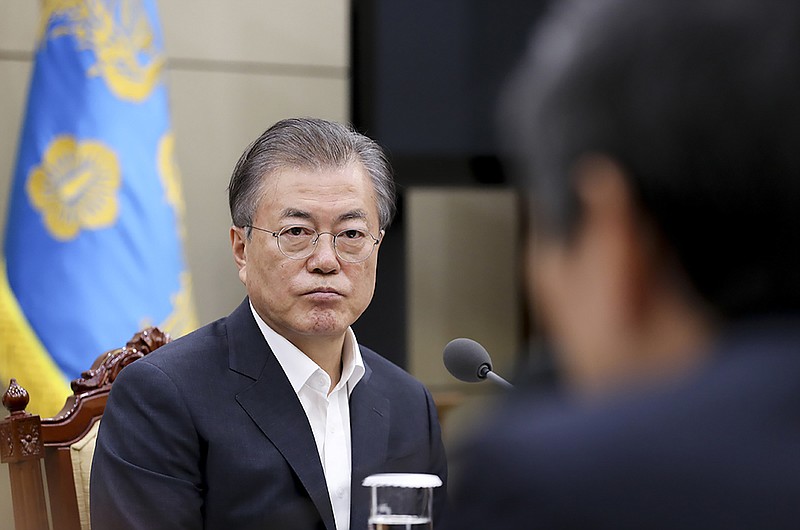SEOUL, South Korea (AP) — South Korea said Thursday it will terminate an intelligence-sharing deal with Japan that focused on classified information about North Korea, a surprise announcement that is likely to set back U.S. efforts to bolster security cooperation with two of its most important allies in the Asian region.
South Korea attributed the decision to its bitter trade dispute with Japan, which has plunged the two countries’ relations to their lowest point since they established diplomatic ties in 1965. Japanese Foreign Minister Taro Kono called the decision “extremely regrettable” and summoned the South Korean ambassador to protest the linking of trade and security issues.
The U.S. expressed disappointment in the decision. Secretary of State Mike Pompeo said the U.S. hopes “each of those two countries can begin to put that relationship back in exactly the right place.” The U.S. is urging Japan and South Korea to continue to talk, he said.
Many experts had predicted that South Korea would be unlikely to spike the 3-year-old intelligence-sharing deal for the sake of its relations with the United States. South Korea has been seeking U.S. help in resolving the trade dispute, and Seoul and Washington have also been working together to restart stalled talks on stripping North Korea of its nuclear weapons.
South Korea’s presidential office said it terminated the intelligence deal because Japan’s recent decision to downgrade South Korea’s trade status caused a “grave” change in security cooperation between the countries.
“Under this situation, the government has determined that maintaining the agreement, which was signed for the purpose of exchanging sensitive military intelligence on security, does not serve our national interests,” Kim You-geun, the deputy director of South Korea’s presidential national security office, said in a nationally televised statement.
He said South Korea would formally notify Japan of its decision before Saturday, the deadline for an extension of the pact for another year.
Kono said in a statement the decision “was an action that completely misjudged the current security environment in the region and is extremely regrettable.”
He said South Korea’s linking of trade and security was “absolutely unacceptable, and we firmly protest to the South Korean government.”
Since early last month, Japan has imposed stricter controls on exports to South Korea of three chemicals essential for manufacturing semiconductors and display screens — key export items for South Korea — and decided to remove South Korea from a list of countries granted preferential trade status.
South Korea accuses Japan of weaponizing trade to punish it over a separate dispute linked to Japan’s brutal colonial rule of the Korean Peninsula from 1910-45. Japan denies that, saying its steps were taken because of unspecified security concerns.
The Japanese trade curbs triggered an outburst of anti-Japan sentiment in South Korea. Many South Korean citizens rallied in the streets, canceled planned holiday trips to Japan and launched widespread boycotts of Japanese beer, clothes and other products. The South Korean government, for its part, decided to downgrade Japan’s trade status.
Some experts said the tit-for-tat actions could eventually hurt South Korea’s economy more than Tokyo’s. Many big South Korean manufacturers including Samsung rely heavily on materials and components imported from Japan, while Japan doesn’t import many vital materials from South Korea.
Liberal South Korean President Moon Jae-in, who earlier declared his country would “never again lose” to Japan, used the Aug. 15 anniversary of Korea’s liberation from Japan to extend an olive branch. Moon said Seoul will “gladly join hands” if Tokyo wanted to talk.
The Pentagon on Thursday expressed “strong concern and disappointment” in the collapse of the agreement.
“We strongly believe that the integrity of our mutual defense and security ties must persist despite frictions in other areas” of the South Korea-Japan relationship,” Pentagon spokesman Lt. Col. Dave Eastburn said. “We’ll continue to pursue bilateral and trilateral defense and security cooperation where possible.”
On Wednesday, the top U.S. envoy on North Korea, Stephen Biegun, told reporters in Seoul he appreciated what he called “strong and continued cooperation between the U.S., South Korea and Japan.”
The intelligence deal went into effect in 2016, reportedly at the strong urging of the United States, which wants to boost three-day security cooperation to better cope with North Korea’s nuclear threat and a rising China. The United States stations a total of 80,000 troops in the two Asian countries, the core of America’s military presence in the Asia-Pacific region.

